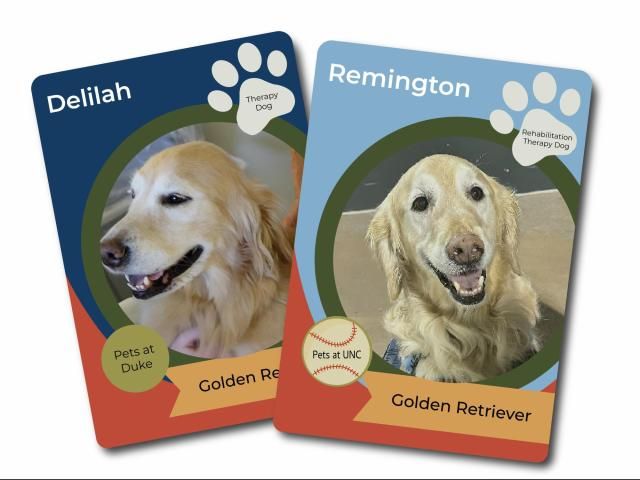For centuries, dogs have been described as man’s best friend.
In a world where stress and uncertainty loom large, dogs – specifically therapy dogs – have emerged as furry vessels of comfort, offering unconditional love and support to those in need.
Just in the Triangle, both Duke Health and the athletics program at the University of North Carolina-Chapel Hill use therapy dogs for their patients and athletes, respectively, a big step for the well-being of the people they serve.
“Dogs have always had a loyalty that other animals can’t replicate,” said Megan Maxwell, graduate assistant athletic trainer for the UNC-CH baseball team. “Dogs are so smart, they’re so loyal. I think that just makes people attracted to them. They’re just one of the rare animals that is able to build that relationship with human beings.”
‘He’s always there for you’
As the national anthem blares over the speakers at Boshamer Stadium before a UNC-Chapel Hill home baseball game, a speck of gold stands out among the sea of players lined up on the field wearing Carolina Blue.
That speck of gold is Remington, a golden retriever who works alongside Terri Jo Rucinski, the baseball team’s head athletic trainer. Remington officially works as a rehabilitation therapy dog for the baseball team and as a medical alert assistance dog for Rucinski. Through Rucinski, Remington also serves as a rehabilitative therapy dog for all UNC-CH athletes receiving physical therapy, as well as helps with their overall health.
“He helps with rehabs just by being there,” Rucinski said. “He can carry things, give them things. There’s a lot of different things that he does, but most of all he’s just here for (the athletes.)”
Rucinski got Remington – affectionally known as “Remi” by the players – in 2016 through paws4people, a non-profit located in Wilmington, North Carolina, that raises, trains and places assistance dogs. On Jan. 3, Remington won the paws4people Dog of the Year contest, beating out 69 other canine contestants. Overall, the contest raised $32,053 for the paws4people Foundation.
“I was just elated,” Rucinski said. “Everybody around here is so excited about it – paws4people is excited, everybody in Wilmington is excited. His reach is so far beyond UNC, and it’s just really heartwarming.”
While Remington is winning contests off the field, he’s also helping athletes win on the field.
In a sport like baseball, which tests the emotional and mental limits of players, having a reliable support system is essential. For the UNC-CH baseball team, that pillar of support is Remington. Whether it's coping with the disappointment of not playing or dealing with the devastating blow of an injury, Remington plays a pivotal role in helping players navigate through challenging times and keeping their spirits high.
“He can sense stress and anxiety. You can’t teach that in an animal, he just has it,” Rucinski said. “If he senses somebody is anxious or upset about something, he’ll go (be) around them, which means that he just goes up to someone and turns around and sits down (near them).”
According to Rucinski, the science behind how a dog can positively impact someone is well-documented. Scientific studies have shown that even the shortest and most infrequent of interactions with therapy dogs helped to decrease perceived stress and increase perceived happiness in college students.
Additionally, in a 2019 study from the American College Health Association, nearly one-third of college students reported significant signs of depression. Factor in the stressors of college athletics on top of the typical things that college students go through, and that number has the potential to be even higher.
“(Remington) helps you take your mind off things,” said UNC-CH pitcher Ryan Fischer, a graduate student from Whitehouse Station, New Jersey. “He’s always there for you, and you don’t have to really worry about anything else when you’re petting a nice, cute dog like him. It doesn’t get better than that.”
Even for an experienced athletic trainer like Rucinski, who has worked for the baseball team for 19 years, there are still times when she can’t help the athletes with something that’s troubling them. But Remington can.
For example, Rucinski said, a player came into the baseball facility feeling sad over something that had recently happened in his life. When she asked if the player needed anything from her, she found out that her furry assistant had already eased the player's mind about his situation.
“If I had to do a list of encounters of athletes coming in whether it’s for treatment with me or to see him, his list is a lot longer than mine. It’s a good thing,” Rucinski said.
‘I get to hug dogs every day’
When Kevlin Swepston started as the Pets at Duke Coordinator in 2023, she immediately witnessed how much of an impact dogs could have on people.
After interacting with a therapy dog, one patient at Duke Health came up to Swepston and thanked her for providing him with a few minutes with the dog. It was the first time the patient had interacted with someone other than his medical staff in more than a week. His gratitude brought Swepston to tears, she said.
“It made me realize the impact that we’re not there just to have a dog. We’re there to actually give them an outlet,” Swepston said. “We’re there for the patients to be able to let out their emotions, and we’ve noticed their stress is less.”
The Pets at Duke program started in 1992 when someone at Duke Health suggested bringing dogs in for oncology therapy recreation and patient entertainment. Sharon Pitz, a longtime dog owner, became the first handler for the dogs used in the program, and she continues to volunteer today, most notably with her golden retriever Delilah.
When Pitz started the program, the dogs only visited two adult oncology floors of the hospital. In the more than 30 years since then, the program has expanded to allow cancer patients, both adult and pediatric and inpatient and outpatient, to have a therapy dog visit them.
Also since then, the science of the behavior of dogs has been studied much more, allowing people to better understand why a dog behaves the way it does. According to Swepston, the emotions the dog takes in from the patients they visit make them tired. This makes it necessary to monitor the dog to know when they’ve had enough so they can get some rest and sleep off the emotions they’ve absorbed.
When the Pets at Duke program brings a dog into the program, the dog undergoes multiple tests to see where it’s best suited. Swepston said they’ll see if the dogs like interacting with kids or adults better and if they’re scared of closed spaces or loud noises among other factors. All of this matters because if you put a dog with small kids and the dog doesn’t react well to them or loud noises, the dog won’t be able to do its job effectively.
“We want to make sure not only are we helping our patients, but we’re making sure (the dogs) are in the right spots,” Swepston said.
As for Pitz, who brings the dogs in, she works to ensure the dogs are suitable to work with patients. When Delilah was first training to become a therapy dog, she was still energetic, and thus Pitz decided she wasn’t ready yet to be brought into the program. By age 3, however, Delilah had found her bearings and was ready. Six years later, she’s still one of Pitz’s primary therapy dogs.
“She enjoys it,” Pitz said. “She loves people, and she just sparks up herself when she’s around people.”
In addition to working with cancer patients, the Pets at Duke program sometimes partners with the physical therapy department to help get their patients up and moving.
Swepston mentioned a time when one of the pediatric physical therapy patients refused to do their physical therapy – but when offered the opportunity to walk one of the therapy dogs around the unit, that stubbornness was gone.
“They don’t realize that they’re doing their PT by just walking down the unit. No, they’re walking a dog,” Swepston said. “For them, that’s even better (than doing PT.)”
No matter whether you’re a pediatric cancer patient or a baseball player in a slump, it’s clear that dogs can make things better. And for people like Rucinski and Swepston, being able to be a part of the teams that can bring a smile – or a friendly tail wag – to people who need help through a tough time, the work is worth it.
“I get to hug dogs every day,” Swepston said. “What part of that job isn’t cool? I get to sit there, and I get to know the teams, the volunteers and the dogs themselves. It brings me joy.”










